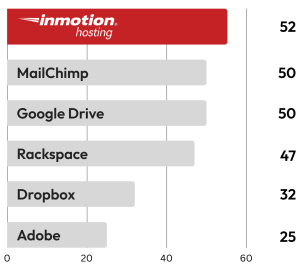VPS Hosting
Scale Your Business Without Slowing Down
Ultra-reliable, high-performance VPS Hosting solutions suited for growing businesses and developers.
- Faster Site Speeds
- Maximum Security
- Choice of Control Panel
- 24/7 Award-Winning Customer Support
Got a question? Speak with our VPS Hosting experts today at +1-757-995-2244 or Request a Call Back


VPS Hosting Plans
VPS 4 vCPU
- 4 vCPU Cores
- 8GB RAM
- 160GB SSD
- 5TB Bandwidth
- 2 Dedicated IPs
- Free SSL
- DDoS Protection
- Free Website Transfers & Server Setup
- Choice of Control Panel
- Live Chat Support from Helpful Humans
VPS 8 vCPU
- 8 vCPU Cores
- 16GB RAM
- 260GB SSD
- Unlimited Bandwidth
- 3 Dedicated IPs
- Free SSL
- DDoS Protection
- Free Website Transfers & Server Setup
- Choice of Control Panel
- Choice of Data Center Location
Includes US and EU Locations - Live Phone and Chat Support from Helpful Humans
VPS 12 vCPU
- 12 vCPU Cores
- 24GB RAM
- 360GB SSD
- Unlimited Bandwidth
- 5 Dedicated IPs
- Free SSL
- DDoS Protection
- Free Website Transfers & Server Setup
- Choice of Control Panel
- 10GB Free Backup Storage
- Choice of Data Center Location
Includes US and EU Locations - Live Phone and Chat Support from Helpful Humans
VPS 16 vCPU
- 16 vCPU Cores
- 32GB RAM
- 460GB NVMe SSD
- Unlimited Bandwidth
- 10 Dedicated IPs
- Free SSL
- DDoS Protection
- Free Website Transfers & Server Setup
- Choice of Control Panel
- 10GB Free Backup Storage
- Docker Available
- Choice of Data Center Location
Includes US and EU Locations - Live Phone and Chat Support from Helpful Humans
Have questions? We can help.
Let us help you choose the right server hardware and configuration for your needs.
VPS Hosting Features
Managed Virtual Private Servers are built on UltraStack for high-performance.
Free Website Transfers
Save time and money transferring your website and let us handle it. Launch Assist offers sysadmin support, expert data migration, and easy server setup with no downtime. Included with your purchase of cPanel or Control Web Panel.
Easy Resource Management
Our custom resource monitoring dashboard gives you quick access to your server stats. Easily view your RAM, disk space, bandwidth, and load usage from dynamic graphs in one central location.
Built-in Redundancy
Prevent any disruption of system operations with high-availability servers. With 24/7 monitoring network, 99.99% uptime, and redundant dedicated HA clusters, your business is always online.
eCommerce Optimized
Keep your customers data protected with servers optimized for Payment Card Industry (PCI) compliance, advanced security, and speed.
SSH & DDoS Protection
SSH protocol lets you securely access and manage your server. DDoS protection is crucial to prevent attackers from overwhelming your server and disrupting SSH access.
Multiple Data Center Locations
Choose the right server location for your business needs. The geographical placement of the data center housing your server can influence the performance of your website hosting.
Buy a VPS Web Hosting Plan with all the Features You Need.
Fully Managed Website Transfers
Migrations and optimizations – all in one. Our Managed VPS Hosting customers get direct access to our expert system administrators. Give your business an elevated level of care with Launch Assist, included with cPanel or Control Web Panel.
- Free site transfers
- Free virtual private server setup
- Free server optimizations
99.99% Uptime
Host your websites confidently with virtually zero downtime. Triple storage redundancy means that three exact replicas of your VPS are stored independently of each other, ensuring no disruption in an emergency. Your website is always online, 24/7.
- Industry leading network monitoring
- Next generation dedicated HA clusters
- 99.99% Uptime
Global Web Hosting
Fast and Secure VPS Hosting
InMotion Hosting operates a network of global data centers strategically located across multiple continents. Data Center locations are crucial for reducing latency, improving website performance, and ensuring redundancy, which all contribute to a seamless and reliable web hosting experience for users worldwide.
Chat with sales for additional data center information
Top VPS Hosting Solution Benefits
Speed
Get Next Generation Speed with InMotion VPS Hosting
Our VPS Hosting plans are built with the fastest SSD storage and have total data redundancy for a fast, reliable environment. SSD storage enhances your business operations by significantly improving server performance compared to traditional HDD storage solutions. Elevate your website’s speed and enhance customer satisfaction with our SSD VPS hosting.
Flexibility
Flexibility and Confidence in your VPS Server Hosting
Explore our managed and unmanaged Linux VPS hosting plans, each offering cutting-edge technology, dedicated resources, and unmatched flexibility. Tailor your configuration precisely to your business needs with managed VPS, or opt for a highly customizable unmanaged VPS for the freedom to choose your operating system.
Security
Rest easy knowing your VPS is Protected
Our managed VPS hosting plans are safeguarded with Corero DDoS protection to defend your business against threats, minimizing vulnerabilities by 98%. Strengthen your security using Monarx, an advanced malware detection and protection system that consistently monitors and scans your files in real time, ensuring the safety of your VPS around the clock.
Reliable VPS Hosting and Live Support
InMotion Hosting’s VPS hosting solutions provide best-in-class server and network performance with the control and flexibility of cPanel, the industry leading control panel. Our VPS plans are the perfect solutions for businesses and websites that need affordable hosting that doesn’t cut corners on server resources or performance.
Easily launch your websites, secure and protect your data, and scale to success with our VPS hosting solutions. Our support team is available 24/7/365 to help you find the best hosting solution that fits your business needs. As a trusted provider and partner in business, InMotion Hosting leads the way in customer loyalty and satisfaction with a Net Promoter Score (NPS) of 52.
Net Promoter Scores (NPS)

Our Trusted Partners
![]()
![]()

Web Panel Options
Choose how you want to manage your Virtual Private Server.
cPanel
Easily manage and grow your websites from the industry leading cPanel. cPanel VPS Hosting gives you access to:
- Industry Leading Control Panel and Website Management Platform
- Free Website Transfers & Server Setup
- Easily Create Email and FTP Accounts
- Secure Remote Access via SSH
- Manage Domains From a Central Panel
- Free SSL, Premium Malware & Hack Protection
- 24/7 Customer Support and an Industry Leading 90-Day Money-Back Guarantee
And much more! VPS Hosting with cPanel is available for purchase during checkout, starting at $20.50/mo.
Control Web Panel
Oversee your business websites with ease on a user-friendly web panel interface. A popular cPanel alternative, Control Web Panel (CWP) hosting includes:
- Multiple End-User Panels and System Services
- Free Website Transfers & Server Setup
- ConfigServer Security and Firewall
- Support for FTP, DNS, and SSH
- cPanel Import Function for Easy Site Transfers
- 24/7 Customer Support and an Industry Leading 90-Day Money-Back Guarantee
Experience all Control Web Panel has to offer. Install CWP on your managed VPS, for $5.00/mo, during checkout.
Explore Our Range of VPS Hosting Solutions to Fit Your Needs
Unmanaged Cloud VPS
Created for
Expert command-line users
The Cloud VPS platform offers full root access for complete freedom to tailor your virtual machine to your requirements and choice of operating system.
WordPress VPS
Created for
High traffic WordPress sites
InMotion Hosting’s managed WordPress hosting plans combine high-performance servers with time-saving maintenance tools in an all-in-one platform.
Reseller VPS Hosting
Created for
Resellers in need of dedicated resources
Includes a WHMCS License, eNom Domain Reseller account, Softaculous, a white-labeled server, and non-branded servconfig nameservers.
Have questions? We can help.
Let us help you choose the right server hardware and configuration for your needs.
VPS Hosting Articles and Guides
VPS Hosting FAQs
What is VPS Hosting?
VPS Hosting, short for Virtual Private Server Hosting, is a versatile solution that balances the benefits of shared hosting and dedicated servers. It involves dividing a physical server into multiple virtual servers, each with its dedicated resources like CPU, RAM, and storage. VPS hosting is ideal for businesses needing more control and resources than shared hosting but without the complexity of a dedicated server.
As the stepping stone between Shared Web Hosting and Dedicated Hosting, VPS Hosting is a reliable and scalable hosting option. With full root access, you can customize your virtualized server environment, install software, and make configurations to fit your specific requirements. VPS hosting also offers enhanced security and isolation, making it suitable for projects handling sensitive data or requiring advanced security.
In essence, VPS hosting is a cost-effective and adaptable solution, providing the performance, control, and customization needed for various online projects. Whether it’s a website or application, VPS hosting strikes a balance between other web hosting options, making it a popular choice for many.
Do I need VPS Hosting?
You or your business needs VPS hosting when you have a large website or online application that requires more resources, control, security, and scalability.
Here are some situations where VPS hosting may be necessary:
- Your website or application receives high traffic
If your website or application receives a large amount of traffic, shared hosting may not be able to handle the load. VPS hosting can provide dedicated resources to ensure that your website or application runs smoothly even during peak traffic periods. - You need more control over your hosting environment
VPS hosting allows you to have more control over your server environment, including installing custom software and configuring settings to meet your specific needs. - You need greater security
VPS hosting provides a higher level of security than shared hosting because you have your own dedicated resources and can implement your own security measures. - You need scalability
VPS hosting can be easily scaled up or down to accommodate changing traffic or resource needs. If your website or application falls into any of these categories, then VPS hosting is a suitable choice for you.
What is the difference between a Managed VPS and an Unmanaged Cloud VPS?
Managed VPS Hosting is a plan that offers complete hands-off management of your server. The management of the server such as OS security patches, cPanel or CWP, and WHM updates, is overseen by a team of in-house experts. Managed VPS plans also include Premier 24/7 Live Support, Launch Assist, cPanel, and Web Host Manager (WHM).
Self-managed Cloud VPS has cheaper options, as they do not come with cPanel, nor other graphical user interface (GUI) software for server management, only SSH. These servers are for technical users with command-line capabilities, and who don’t need assistance with their hosting plan.
Discover all the differences between cPanel VPS hosting and Cloud Servers in this in-depth article. Looking to buy VPS hosting today but unsure which plan to choose? Chat with one of experts now for a personalized recommendation.
What makes InMotion Hosting VPS Hosting different?
InMotion Hosting offers new customers their choice of SSD or NVMe High Availability server clusters, each delivering incredible speed and performance – all at no additional cost. Our NVMe technology offers more than double the link speed of SATA HDD drives, with 3-6x faster data transfer rates between storage devices and hardware components. With InMotion’s VPS infrastructure, you can significantly improve the overall performance of your website or web application.
Not sure where to start on your new high performance VPS? InMotion Hosting provides free support for Managed VPS Hosting plans. We have web hosting experts available 24/7 to provide technical support. Rest easy knowing that help is just a click away and available by phone, live chat, and ticket.
How do I transfer my website to InMotion VPS Hosting?
All Managed VPS Hosting plans paired with cPanel or Control Web Panel include free website transfers and server setup through Launch Assist. Launch Assist is a service we offer for our high-end plans to help customers easily transfer or launch your site. A VPS with an added control panel comes with two free hours of dedicated support with a trained SysAdmin who can help migrate or customize your server. Take advantage of Launch Assist for zero-downtime, fully-managed website migrations, and custom server setups with a team of experts. Learn more about what Launch Assist can do for your Virtual Private Server.
Free website transfers do not apply to unmanaged VPS Hosting plans without a control panel.
Can I upgrade or downgrade my VPS Hosting plan?
Upgrading and downgrading your VPS hosting plan is simple and easy. If you’ve outgrown or underutilized your current plan, you can easily sign in to your Account Management Panel to upgrade or downgrade your plan to match your current hosting needs.
We are not only a VPS hosting provider – we have any plan to suit your business needs and budget, from WordPress and Shared Hosting to Dedicated Servers. You can also change your plan’s billing terms to periods of 1 year, 2 years, even 3 years.
What is the difference between cPanel, Control Web Panel, and no panel?
The choice between cPanel, CWP, or no panel depends on your specific business needs and preferences.
- If you prefer a more standardized and widely used control panel or if you require specific features that are only available in cPanel, then cPanel may be the better choice for you.
- If cost is a major consideration, then Control Web Panel (CWP) may be a better option for your business. Keep in mind, using any control panel can make it easier to manage your website and hosting environment, especially if you have little to no experience in server administration.
- “No panel” refers to the practice of managing a server or website without the use of a web hosting control panel. This requires a greater level of technical expertise and comes with with a higher level of risk as it is harder to manage. No panel can also be more time-consuming than using a control panel if you are not familiar with command-line access.
What data center locations do you offer and what should I choose?
InMotion Hosting offers VPS Hosting within our data center locations in California and Virginia, USA, as well as within a European data center in Amsterdam, Netherlands.
We’re Here to Help
Contact Our Experts
Choose the Best VPS Hosting Plan
Talk with a VPS Hosting expert now to answer any of your questions.

